CalMac ferry staff stage 24-hour strike
- Published
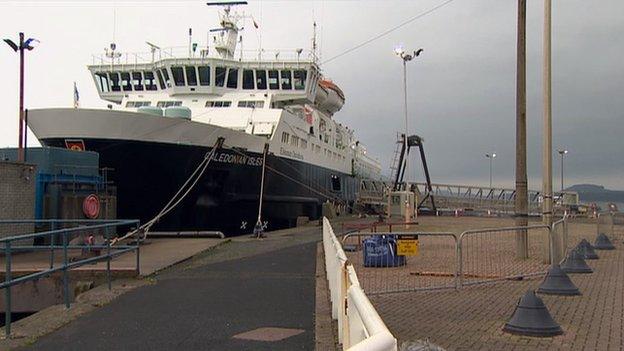
CalMac had planned operate nine of its 27 routes on Friday
Two thirds of ferry services on the west coast of Scotland have been suspended as RMT union members in Caledonian MacBrayne's workforce stage a 24-hour strike.
The dispute centres on a tendering process which could see the Clyde and Hebrides routes taken over by Serco, a private firm.
The strike, which began at midnight, follows a two-day work to rule.
CalMac said 90% of the routes they had said would run were operational.
The state-owned ferry operator has uploaded revised timetables, external to its website.
The ferry MV Loch Seaforth will make an extra sailing on Saturday which will see it leave Stornoway for Ullapool at 20:00 before later returning to Stornoway, CalMac has said.
It has been operating a third of its ferry services on Friday, with nine of its 27 routes sailing as normal or to an amended timetable.
In total, CalMac said it would still be able to carry about 40% of normal passenger capacity across its network.
The routes mainly affected will be those serviced by the company's larger vessels including the Outer Hebrides, Mull, Colonsay, Coll, Tiree and Islay.

What has triggered the dispute?
CalMac's contract to run the Clyde and Hebrides ferry services comes to an end next year.
The Scottish government has put the contract out to tender, in line with European rules.
The RMT union has concerns that, regardless of who wins, the new contract will see changes in employees' current terms and conditions.
A reduction in staff numbers and pensions are key areas of concern.
The RMT has asked that the government guarantee in the new contract that compulsory redundancies do not happen and existing terms and conditions are continued.

A number of the smaller routes that attract large numbers of passengers such as Iona will operate as normal.
CalMac managing director Martin Dorchester said: "Obviously we are disappointed that the strike has gone ahead, but I would like to thank our staff who are working hard to keep our lifeline services open.
"They have managed to rebook 95% of passengers who were due to sail with us today and we are still carrying 40% of our normal capacity."
Mr Dorchester called on the RMT "to think again about our generous offer" to build a no compulsory redundancies offer into the Clyde and Hebrides contract bid.
He added: "What other organisation either in the public or private sector offers such a cast iron guarantee over job security?
"The offer is still on the table along with other discussions around terms and conditions, so, I say to them let's put this harmful action behind us and get back to talks."
CalMac and Transport Scotland have also made contact with bus, rail and aviation operators to arrange additional services to help mitigate the impact.
RMT members make up about half of the state-owned ferry company's 1,400 employees.
A second trade union, the Transport Salaried Staffs' Association (TSSA), which represents 100 ticket-office staff and managers at CalMac Ferries, will also ballot its members on industrial action next week.
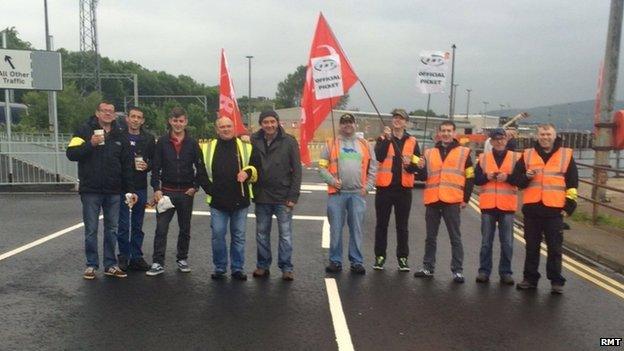
The strike began at midnight
The dispute between CalMac and its employees was triggered by the Scottish government's tendering process for the contract to run the Clyde and Hebrides ferry network.
CalMac is facing a challenge from private operator Serco to renew the contract.
Scottish ministers have said they are forbidden by EU competition regulations from favouring one bid over another, and that an independent panel would ensure the procurement process was "fair, open and transparent".
They have also said that breaking the law would leave ministers open to a costly legal challenge with the likelihood of substantial fines.
But union leaders have said that if Serco won the contract it would mean the privatisation of Clyde and Hebrides ferry services.
And they have raised concerns about the potential impact on jobs and employees' current terms and conditions, regardless of who wins the contract.
The RMT has secured support for its call for the ferry routes to remain in public sector operation from members of the SNP, Labour and the Independent Green coalition.
General secretary Mick Cash said his members remained "rock solid" in their support for industrial action to "defend CalMac from an unnecessary and damaging attack".
CalMac's managing director Martin Dorchester described the strike action as "limited in scope", but acknowledged it would "undoubtedly still hit the communities we serve hard."
Mr Dorchester said: "It is not just an inconvenience at the start of the tourist season - it will impact island businesses where it hurts most, in their pockets."
On Thursday, Deputy First Minister John Swinney chaired the third meeting this week of the Scottish government's resilience team.
He said CalMac had done a "commendable job" in putting on enough services to carry about 40% of normal passenger capacity.
Mr Swinney added: "I would urge common sense to prevail and for the islands to be provided with certainty so that they can plan ahead with confidence in future."
- Published25 June 2015
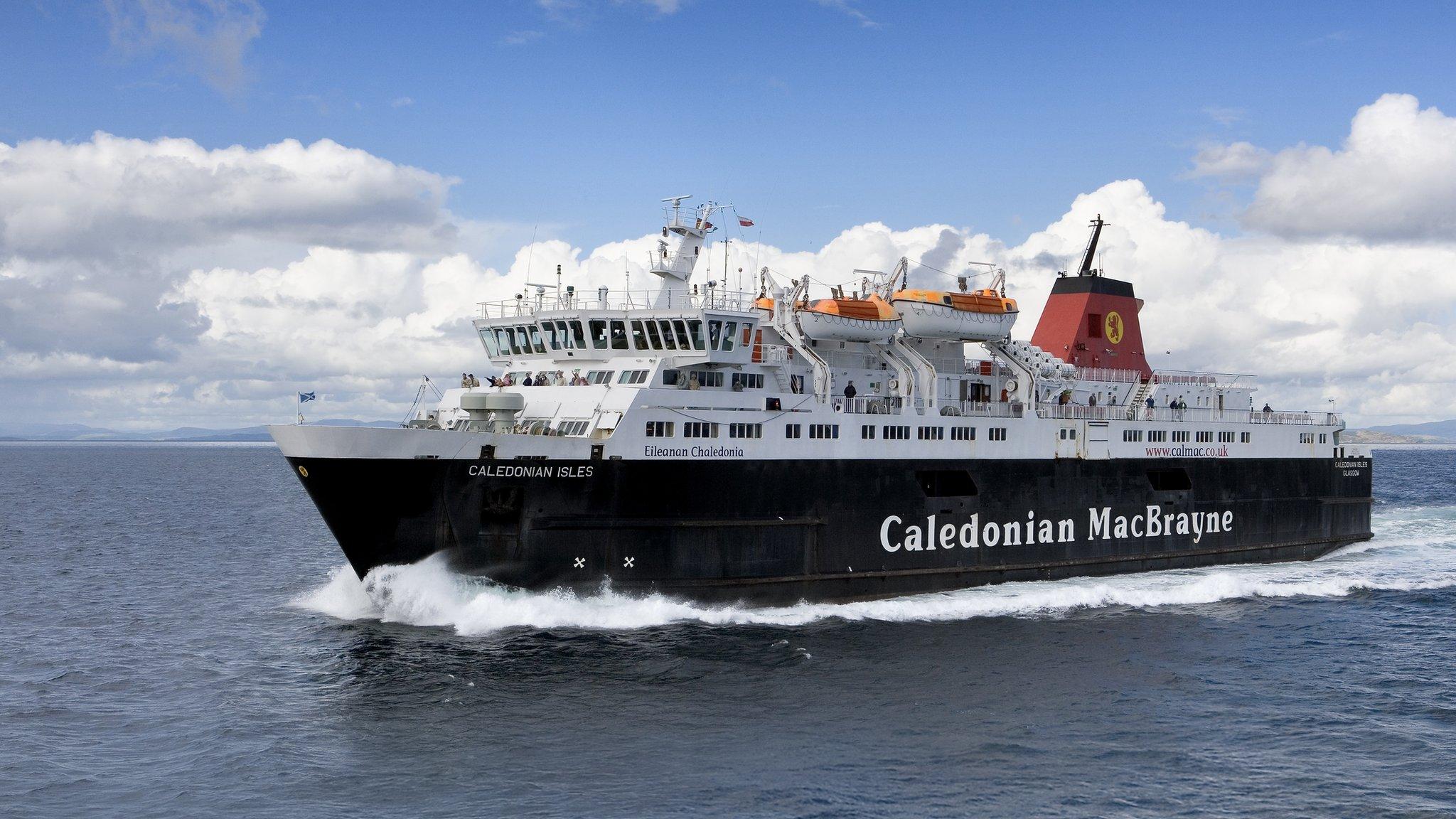
- Published24 June 2015
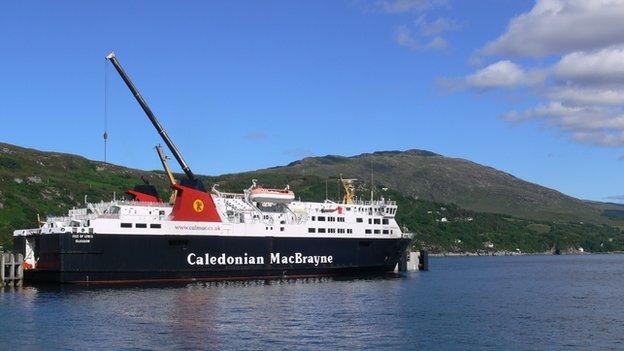
- Published24 June 2015
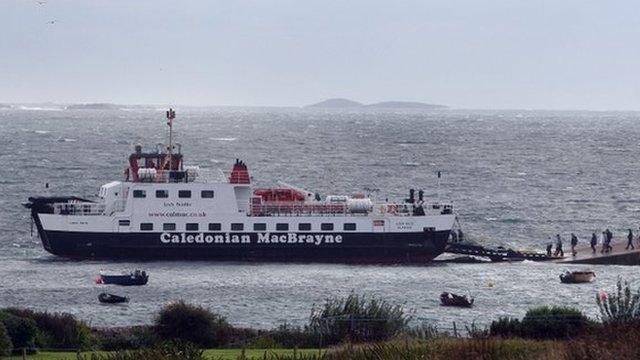
- Published22 June 2015
